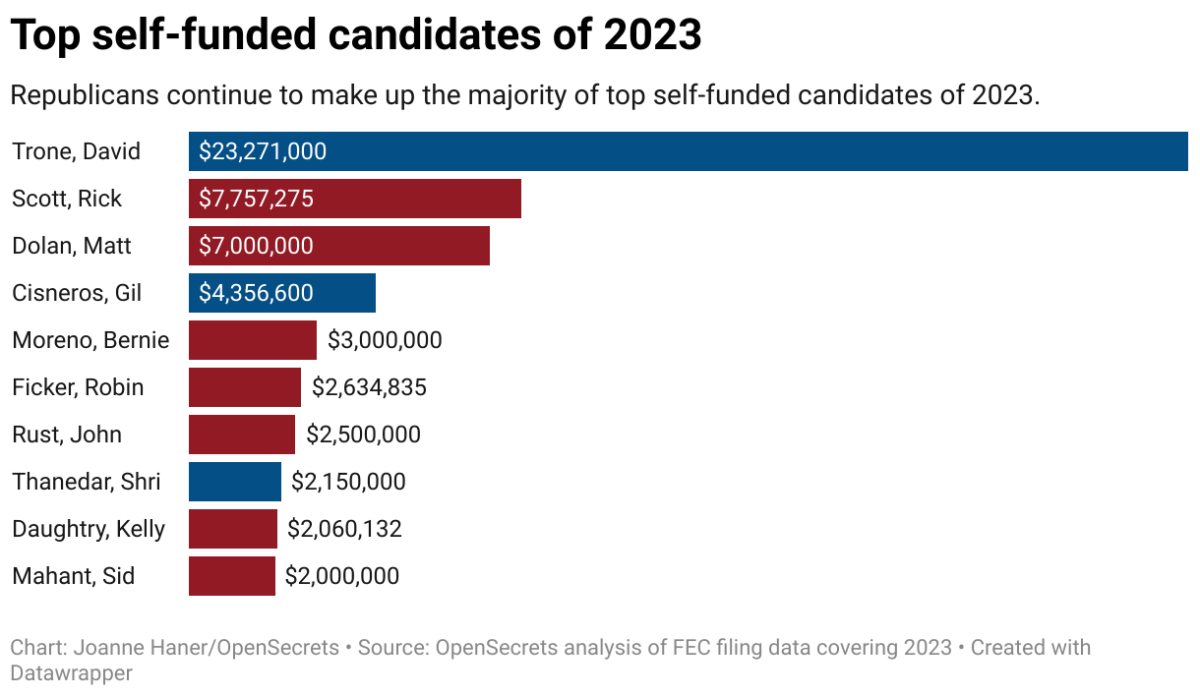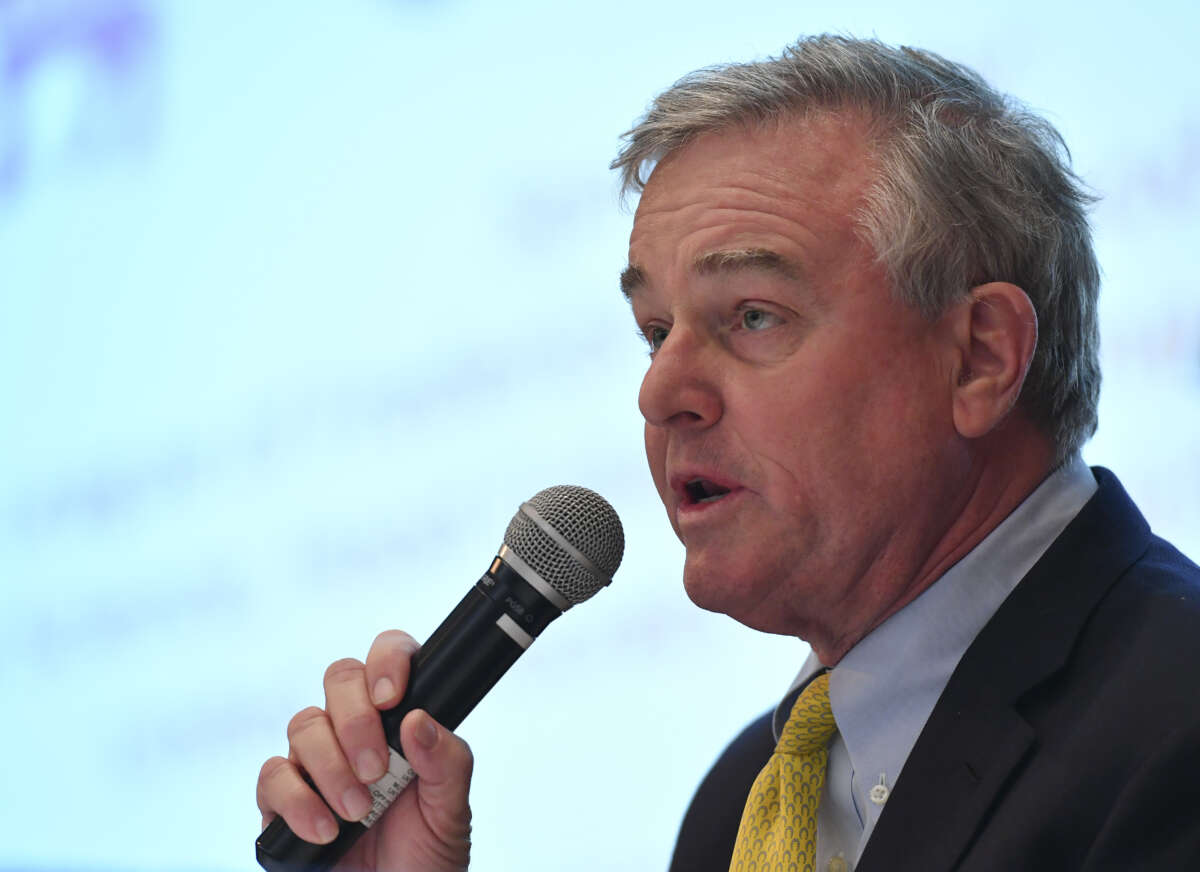Honest, paywall-free news is rare. Please support our boldly independent journalism with a donation of any size.
Self-funded Republican congressional candidates outpaced and outnumbered their Democratic counterparts in 2023, an OpenSecrets analysis found. Thirty-six Republican candidates poured more than $53.5 million of their personal fortunes into their campaigns, while 14 Democrats self-funded over $39 million.
Altogether, candidates poured nearly $94 million into self-funding their campaigns in 2023, according to reports available through Feb. 22. This is slightly less than the $118 million that candidates had self-financed at the same point in the 2022 election cycle.

While Republicans collectively spent more on their own campaigns than Democrats, the candidate who steered the most money into his campaign was a Democrat. Rep. David Trone (D-Md.), the owner of liquor retailer Total Wine & More, steered $23.2 million into his U.S. Senate campaign in 2023 — virtually all the money he reported raising that year.
“He will be the only U.S. Senator who has never taken a nickel from PACs or lobbyists — giving him the independence to fight for what truly matters,” a campaign spokesperson told OpenSecrets. “David is the only candidate in the primary or general election who refuses to accept contributions from PACs, lobbyists, or other special interests. That gives him the freedom to travel to every corner of the state, listening to voters and understanding their concerns.”
Trone currently serves as a representative for Maryland’s 6th Congressional District, but he is gunning for the state’s open Senate seat in 2024.
Challengers and candidates in open seats also spent more of their money on campaigns than incumbents — $83 million to $10.9 million during the 2024 election cycle.
When incumbent candidates self-fund their own campaigns, they tend to fund a smaller portion of it. While incumbents who self-fund finance, on average, 46% of their campaign funds, challengers and candidates running in open seats finance 73% and 85% of their campaigns, respectively.

Non-incumbents have led the way in self-financing, as 47 reported contributing to their campaigns, compared to four incumbent candidates. Republican candidate Matt Dolan is the highest self-funded challenger as he runs for a seat in Ohio’s Senate race against incumbent Sen. Sherrod Brown (D-Oh.). Dolan, a lawyer, comes from a rich family that acquired its wealth by investing in cable television. Forbes ranked the Dolan family as America’s 54th richest family in 2015.
The only incumbent candidate at the top of the self-funding charts was Sen. Rick Scott (R- Fla.). Although he is one of the highest self-funders, he is also one of the lowest spenders in terms of the rest of his campaign. Scott self-funded 42% of his campaign, contributing $7.8 million of the $18.6 million he reported raising for his reelection. He is notably one of the richest members of Congress, obtaining his wealth after founding the Columbia Hospital Corporation in 1988. The company would later merge with the Hospital Corporation of America, becoming the largest for-profit hospital chain in the country.
Male self-funded candidates also outnumber female self-funded candidates by more than 5 to 1. Female candidates self-funded just over $7 million in 2023, whereas male candidates made up the remaining near $87 million.
The Center for American Women and Politics has partnered with OpenSecrets on a series of reports examining the gender gap in the finances of politics at the state and federal level. They have found that at the state level, female candidates are less likely to self-fund compared to male candidates and attribute this disparity to differences in personal wealth.
“In general, women earn less than men, so gender earnings have consequences in politics,” Kira Sanbonmatsu, senior scholar at CAWP, told OpenSecrets. “We have been interested in learning about that statistic because of what we know about gender differences in the economy.”
The most self-funded female candidate was Republican candidate Kelly Daughtry in her campaign for the open seat representing North Carolina’s 13th Congressional District. An attorney, Buckhout has self-funded 96% of her campaign, channeling just over two million dollars into her candidacy.
In December, the Federal Elections Commission approved new rules allowing candidates to receive a salary from campaign funds — a move advocates said will lower financial barriers for working-class candidates, especially women and people of color, to fairly compete against wealthy opponents.
Although Congress is currently more diverse than it has ever been, women and people of color still make up less than one-third of lawmakers, according to the Pew Research Center. A majority of lawmakers are also millionaires.
Speaking against the authoritarian crackdown
In the midst of a nationwide attack on civil liberties, Truthout urgently needs your help.
Journalism is a critical tool in the fight against Trump and his extremist agenda. The right wing knows this — that’s why they’ve taken over many legacy media publications.
But we won’t let truth be replaced by propaganda. As the Trump administration works to silence dissent, please support nonprofit independent journalism. Truthout is almost entirely funded by individual giving, so a one-time or monthly donation goes a long way. Click below to sustain our work.
